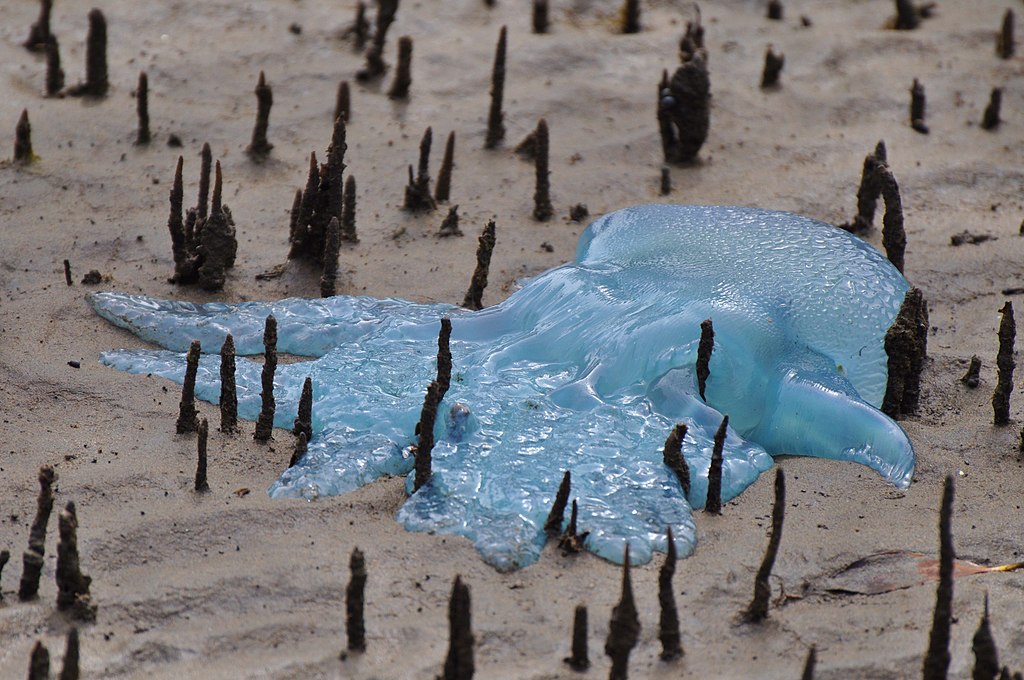【the inherent eroticism of the sea】
On Hannah Black’s Pandemic Novella,the inherent eroticism of the sea Barthelme, and Pessoa
The Review’s Review

Blue jellyfish. Photograph by Annette Teng. Licensed under CC BY 3.0.
Hannah Black’s novella Tuesday or September or the Endbegins in the early months of 2020, on the heels of a strange discovery: an alien object, oak-tree-like but seemingly machine-fabricated, has materialized on the shore of Jones Beach. According to the frenetic narrative of the news, one that chokes everyday life, it would seem that everyone in America is obsessed with the possibility of alien contact. But Bird initially has no interest in the strange object; she is a communist who would rather “talk about her feelings,” while her boyfriend, Dog, a social democrat, tries to “embrace popular feeling”—he is “among the enraptured many.” In March, after COVIDis recognized as a legitimate threat to life, the couple is separated without ceremony or passion. They seem uninterested in reuniting until riots following the murder of George Floyd turn into a revolution: all prisoners are released, and Rikers falls into a sinkhole.
In the real-life early months of 2020, it was assumed—at least by magazine editors, and the writers they commissioned—that collective grief was best understood through a process of individual accounting: reflections on how one spent or wasted or optimized their newfound free time. “Pandemic diaries,” as these reflections became known, promised to do the work of explaining ourselves to ourselves. Today, they have altogether disappeared. Tuesday or September of the Endbears many of the superficial marks of the genre; the events of the book are demarcated by the months in which they occur, and, as Black told BOMB, it is “a fictionalized version of the first six months of 2020 … as if you can fictionalize time itself.” But while the diary fixates on the ordinary, attempting to derive collective meaning from individual routine, Black’s novella mobilizes an absurd and unlikely third party whose arrival signals a break from the anesthetizing qualities of contemporary life. Humanity submits “itself as an object of study” for the aliens, who interview people one by one; the aliens, in turn, suffer from “the introduction of the concept of prison,” but are “deeply healed by riot.” I was so compelled by their psychology, which enables the couple and all of the other humans they live among to feel collective liberation as something tangible, inevitable, and already arising.
—Maya Binyam, contributing editor
Being a student makes the summer a strange, unique, and stressful time, because it leaves you to read anything, and everything, you want. This tyranny of choice has led me to the summer practice of keeping two books going at once. Right now, I’m reading Donald Barthelme’s 1968 story collection, Unspeakable Practices, Unnatural Acts, alongside Fernando Pessoa’s Book of Disquiet, a quasi-diary written throughout the 1910s. The stories in the first include classics of the New YorkerFiction section like “The Balloon” and “The President”; they are nimble, absurd, devastating, and singular in their significance, not only as great fiction but as part of American history (“Robert Kennedy Saved From Drowning” was published just two months before the real Kennedy’s assassination). The latter is the fragmented “factless autobiography” of the isolated book clerk and Lisbonite Bernardo Soares, one of Pessoa’s many heteronyms. It was a career-spanning project left unedited and incomplete, published almost fifty years after the writer’s death.
I usually don’t give much curatorial thought to these combinations—one becomes my daytime reading, I switch to the other by night, and they tend to balance each other out—but I’ve found these two to be almost disconcertingly related. They seem to speak to each other through a playful common language of existential anticoncern, a very summery divestment from the search for meaning. “The only attitude worthy of a superior man,” writes Pessoa, “is to doggedly pursue an activity he recognizes is useless, to observe a discipline he knows is sterile, and to adopt norms of philosophical and metaphysical thought that he considers utterly inconsequential.” Meanwhile, Barthelme’s narrator in “See the Moon?” conducts a brief but revelatory interview with a character who might easily have read Pessoa themselves: “‘Is there any value that has value?’ I asked. ‘If there is any value that has value, then it must lie outside the whole sphere of what happens and is the case, for all that happens and is the case is accidental,’ he said. He was not serious. I wrote in my book, knows the drill.”
—Owen Park, reader
Search
Categories
Latest Posts
Redux: The Tempo Primed by The Paris Review
2025-06-27 03:17NYT's The Mini crossword answers for January 3
2025-06-27 02:52My Mother by Brit Bennett
2025-06-27 02:36Hands on with Lenovo's 'rollable' display laptop at CES 2025
2025-06-27 02:15Popular Posts
NYT's The Mini crossword answers for December 30
2025-06-27 03:05The Art of Distance No. 11 by The Paris Review
2025-06-27 02:46Featured Posts
Dance Time, across the Diaspora by Nadia Owusu
2025-06-27 03:28What Color Is the Sky? by Nina MacLaughlin
2025-06-27 03:15Policing Won’t Solve Our Problems by Alex S. Vitale
2025-06-27 02:29Australia vs. India 2024 livestream: Watch 5th Test for free
2025-06-27 01:58Popular Articles
Best Xbox Elite Series 2 deal: Save $32 on this pro
2025-06-27 03:54Redux: Red, Black, and Purple Zigzags by The Paris Review
2025-06-27 03:50My Lighthouses by Jazmina Barrera
2025-06-27 03:41Staff Picks: Gabbert, Guzzler, and Greene by The Paris Review
2025-06-27 02:42Newsletter
Subscribe to our newsletter for the latest updates.
Comments (637)
Ignition Information Network
The Best Sports Video Game of All Time
2025-06-27 04:07Free Roaming Information Network
The Mickey Mouse horror game is already changing its name
2025-06-27 03:25Unique Information Network
Where Does the Sky Start? by Nina MacLaughlin
2025-06-27 03:00Openness Information Network
Philip Roth’s Last Laugh by Benjamin Taylor
2025-06-27 02:33Pursuit Information Network
Dating app happn launches AI
2025-06-27 02:05